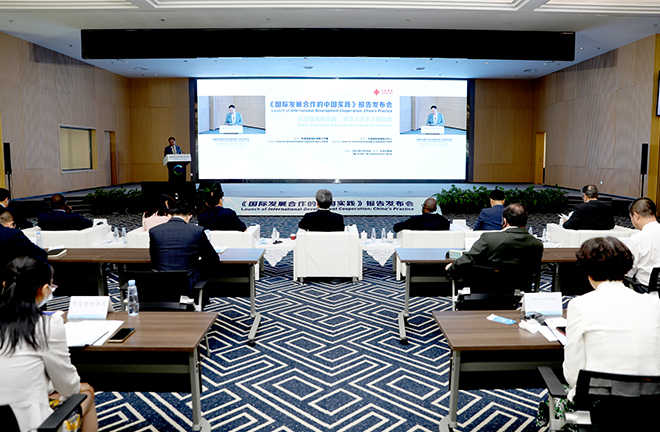Innovation in international development theory

The China International Development Cooperation Agency launched online journal International Development Cooperation: China’s Practice on May 18th. Photo: Zhao Jun/CNSphoto
The field of international development emerged in the late 1940s and was long dominated by the Western world, particularly the United States and Europe. Since the beginning of the 21st century, the growing participation of China and other emerging powers in international development has led to a diversification of practices and knowledge in this field, providing further impetus for the innovation of international development theory.
History of innovation
Modernization theory dominated the knowledge system of international development in the 1950s. This theory equated “modernization” with “Westernization,” arguing that underdeveloped regions will develop if they fully adopt Western lifestyles and political institutions. Despite serious flaws in its romanticized notion of Western countries and its linear understanding of development, modernization theory shaped the Eurocentric core of Western development theory.
Dependency theory, proposed by Latin American scholars, was popular in the 1960s. It challenged modernization theory by exposing the exploitative nature of the Western capitalist world system. Dependency theory posited that the development of the West was predicated on the persistent underdevelopment of other regions of the world. However, development policies guided by this theory proved inadequate, primarily due to its tendency to excessively focus on the negative aspects of the global system.
In the 1980s, the dominant international development theory shifted towards neoliberalism, which emphasized free markets, globalization, and minimized government intervention. Since the 1990s, there has been a growing recognition within academia of the limitations of neoliberal development theory in disregarding the role of government. Scholars have reexamined the political and economic logic behind the East Asian miracle, highlighting the proactive and interventionist role played by the governments of the “Four Asian Tigers” in guiding and regulating market activities.
Diversification of practice
The rise of China has contributed to innovation in international development, particularly at the practical level.
China has a long history of involvement in international development. Since its first foreign aid programs in 1950, China has consistently provided support to developing countries. Prior to the Reform and Opening-up, China’s approach to foreign aid was oriented around the needs of recipient countries. It was characterized by favorable terms and non-conditionality, with a focus on providing tangible, in-kind assistance and promoting productive projects.
Since the Reform and Opening-up, China has selectively reformed traditional aid models based on the principles of mutual benefit and efficiency improvement. First, widely praised principles and practices such as needs-orientation and free conditionality have been preserved. Second, China has shifted the focus of cooperation towards infrastructure projects, taking into account its own conditions. Third, China has strived to diversity funding sources for development cooperation to reduce costs and increase efficiency.
Guided by the principles of extensive consultation, joint contribution and shared benefits, China’s international cooperation in the new era continues to strengthen the “infrastructure +” cooperation model. It gradually incorporates rules regarding loan sustainability and security set by the World Bank and the IMF, among other institutions, while adhering to diversified and mixed financial support.
Advances in practice have also fueled academic research. In China, studies on international development cooperation were centered on policy description. However, innovative progress has been made in recent years. Concepts and theories such as “development guided assistance” and “parallel experience sharing” help us better summarize the characteristics of China’s international development practices that are distinct from those of the West.
As China provides more international public goods, and the Chinese model of international development cooperation produces an increasingly strong demonstration effect, international development practices of the West have placed more emphasis on the agency of partner countries and infrastructure projects.
Establishing the Chinese system
To promote radical innovation in international development theory and practice, it is necessary to combine efforts at the practical level with the establishment of an innovative theoretical system. Based on its distinctive model of international development practice, China can concentrate its efforts on three aspects in order to build a more systematic, specialized and widely applicable international development theory.
First, the humanistic, ecological, and cosmopolitan features of China’s new development philosophy can serve as the basis for further promoting dialogue and mutual learning between China’s new development philosophy, and traditional Western approach, and non-Western development philosophies.
Second, in recent years, there has been a growing recognition among academics of the pivotal role played by the government in China’s development. Further consolidating the theoretical consensus and integrating various middle-range theories into an independent knowledge system of Chinese development studies will help shape a more powerful academic discourse.
Third, transforming the development theory with Chinese characteristics into a widely applicable general development theory will provide us with the knowledge needed to offer development solutions to underdeveloped countries. To achieve this goal, we should fully understand the local conditions in partner countries and make targeted modifications to development theory originating in China.
To ensure the successful global expansion of the Chinese development theory, it is crucial to emphasize the significant role that platforms such as academic associations, journals, and international organizations play in the production and dissemination of knowledge.
Yu Bowen is from the School of International Relations and Public Affairs at Fudan University.
Edited by WANG YOURAN
